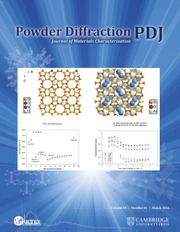Crossref Citations
This article has been cited by the following publications. This list is generated based on data provided by
Crossref.
Shi, Xiangjun
Chen, Qifeng
Deng, Yu
Xing, Xiaoyi
Wang, Chao
Ding, Zejie
and
Su, Weike
2022.
New Case of Pharmaceutical Solid-State Forms: Several Novel Solvates/Polymorphs of Nilotinib and Their Phase Transformation Controls.
Crystal Growth & Design,
Vol. 22,
Issue. 8,
p.
4794.
Li, Zunhua
Liao, Xu
Gong, Zicheng
Zhang, Bowen
and
Nawaz, Asad
2024.
An Investigation of the Impact of Precipitation Temperature and Filter Cake Thickness on the Physical Stability of Amorphous Solids: A Case Study.
Molecules,
Vol. 29,
Issue. 10,
p.
2327.
Li, Zunhua
Gong, Zicheng
Zhang, Bowen
and
Nawaz, Asad
2024.
Investigation of the Influence of Anti-Solvent Precipitation Parameters on the Physical Stability of Amorphous Solids.
Molecules,
Vol. 29,
Issue. 6,
p.
1275.
Goloveshkin, A. S.
Kulikova, E. S.
Novikov, R. A.
Vologzhanina, A. V.
and
Korlyukov, A. A.
2024.
Crystal Structure of Nilotinib Hydrochloride Monohydrate According to Powder X-Ray Diffraction Data.
Journal of Structural Chemistry,
Vol. 65,
Issue. 3,
p.
585.
Yuan, Zhihui
Li, Zunhua
Luo, Jie
Nawaz, Asad
Zhang, Bowen
and
Dessie, Wubliker
2024.
The Optimization of Pair Distribution Functions for the Evaluation of the Degree of Disorder and Physical Stability in Amorphous Solids.
Molecules,
Vol. 29,
Issue. 10,
p.
2379.
Li, Zunhua
Luo, Jie
Chen, Xuncai
Zhang, Bowen
Nawaz, Asad
and
Dessie, Wubliker
2024.
Optimization of precipitation conditions for producing physically stable amorphous solids using pair distribution function and reduced crystallization temperature.
Journal of Drug Delivery Science and Technology,
Vol. 91,
Issue. ,
p.
105268.
Yuan, Zhihui
Liao, Xu
Zhang, Bowen
Nawaz, Asad
and
Li, Zunhua
2025.
Influence of Neutralization Precipitation Conditions on the Physical Stability of Amorphous Solid Pharmaceuticals.
Molecules,
Vol. 30,
Issue. 4,
p.
764.



